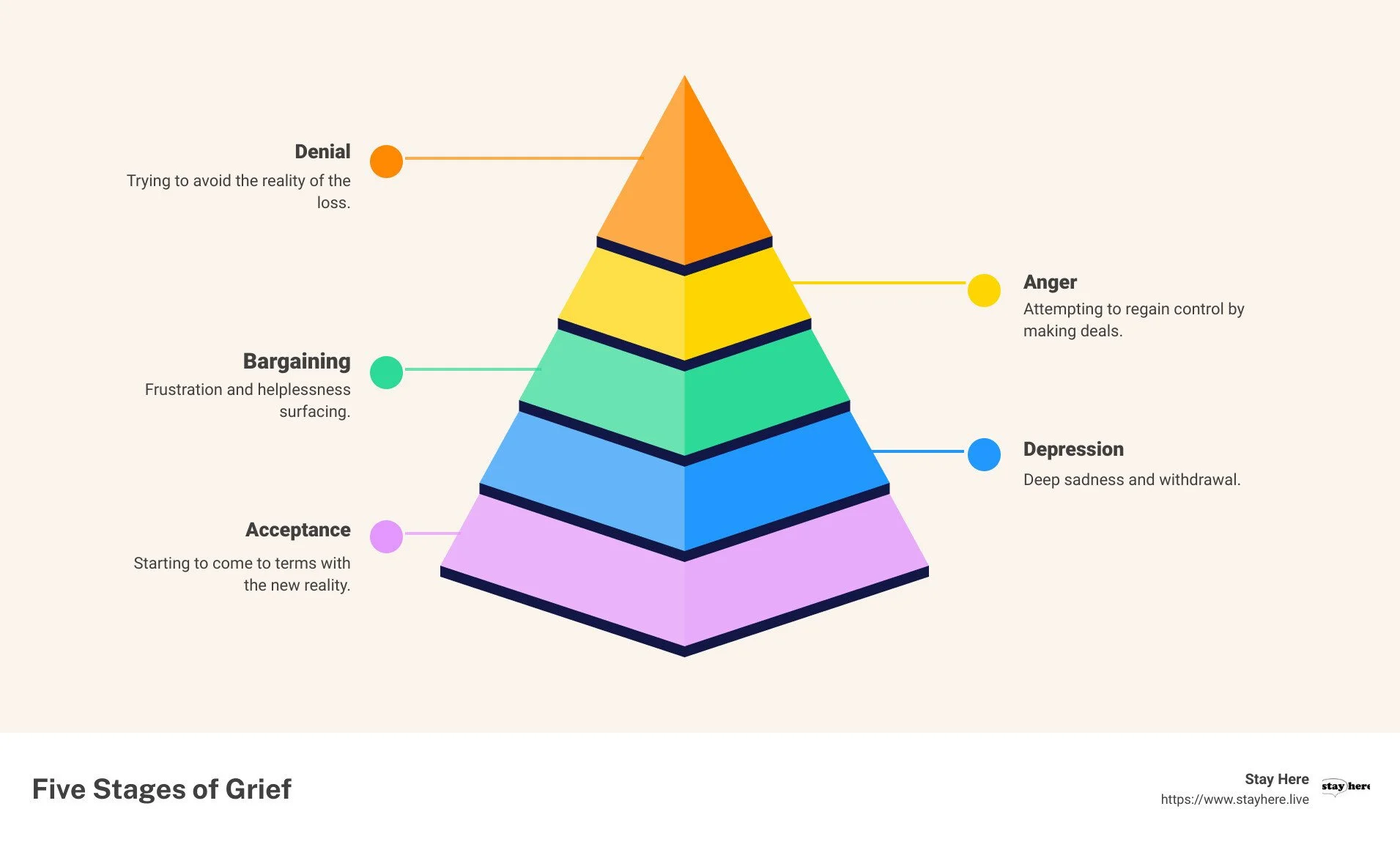A Practical Guide to Understanding the Stages of Grief
Understanding Grief: A Universal Yet Personal Journey
The stages of grief—denial, anger, bargaining, depression, and acceptance—are a part of the emotional rollercoaster everyone experiences after a significant loss. Our aim is to outline these stages to help you understand and steer this challenging process.
Denial: Trying to avoid the reality of the loss.
Anger: Frustration and helplessness surfacing.
Bargaining: Attempting to regain control by making deals.
Depression: Deep sadness and withdrawal.
Acceptance: Starting to come to terms with the new reality.
Grief is a universal experience everyone will face. Whether it's the loss of a loved one, an ended relationship, or a significant change in life, grief touches us all. However, it's important to remember grief is also deeply personal and non-linear. This means that emotions may come and go in waves rather than following a set path.
As Elizabeth Kübler-Ross noted, the stages of grief can overlap and vary from person to person. One might feel acceptance one day, only to be overwhelmed by anger the next. Understanding these stages can help you steer your unique journey.
I'm Jacob Coyne. With my experience as a mental health advocate and founder of Stay Here, I've helped countless individuals understand and cope with the stages of grief. We'll explore these stages in depth to provide you with the guidance and support you need.
The Five Stages of Grief
Denial
Denial is often the first reaction to a significant loss. It's our mind's way of protecting us from the immediate shock and pain. You might feel numb, in disbelief, or like you're living in a bad dream. This defense mechanism helps buffer the initial blow, giving you time to process the reality of the situation.
For instance, after losing a loved one, you might find yourself thinking, "This can't be happening," or expecting them to walk through the door any moment. Denial is a temporary response that helps you survive the first wave of pain.
Anger
As denial fades, it's common to feel intense anger. This stage can be surprising, especially if you're not used to confronting anger. You might feel angry at yourself, others, or even the person who died. Anger can be directed at inanimate objects, strangers, friends, or family members.
For example, you might ask, "Why me?" or "What did I do to deserve this?" This anger serves a purpose; it gives you something to hold onto and helps you feel connected to reality. It's important to allow yourself to feel this anger without judgment.
Bargaining
In the bargaining stage, you might start making "what if" or "if only" statements. This is a way to regain a sense of control and make sense of what happened. You might find yourself thinking, "If only we had gone to the doctor sooner," or "What if I had done something differently?"
This stage can also involve religious bargaining, where you might make deals with a higher power in hopes of reversing the loss. It's a natural part of the grieving process that reflects your vulnerability and helplessness.
Depression
Depression is when the reality of the loss truly sinks in. You might feel deep sadness, emptiness, or hopelessness. This stage can be overwhelming, and it's not uncommon to feel isolated and withdrawn.
This depression is a natural response to a significant loss, not a sign of mental illness. If you find it hard to function in daily activities, reaching out for support can be beneficial. You're not alone in this journey.
Acceptance
Acceptance doesn't mean you're okay with the loss, but that you've come to terms with it. This stage allows you to start adjusting to your new reality. You might begin to live again, finding ways to remember and honor your loved one while moving forward with your life.
Acceptance is about learning to live with the loss. It doesn't mean forgetting, but finding a way to carry the memories with you as you continue your journey.
Grief is a personal and non-linear process. As Elisabeth Kübler-Ross noted, the stages of grief can overlap and vary from person to person. One day you might feel acceptance, and the next, you might be overwhelmed by anger. Understanding these stages can help you steer your unique journey.
The Seven Stages of Grief
Shock and Denial
When a significant loss occurs, the initial reaction is often shock and denial. This stage is marked by disbelief and numbed feelings. You might think, "This can't be happening," or expect things to return to normal any moment. It's your mind's way of protecting you from the immediate impact of the loss. This temporary response helps you survive the first wave of pain.
Pain and Guilt
As the shock begins to wear off, you may experience pain and guilt. The loss feels unbearable, and you might think you're making others' lives harder because of your grief. Questions like, "How could this happen?" or "What did I do wrong?" are common. This stage can be extremely distressing, but it's a natural part of the grieving process.
Anger and Bargaining
Next, you might find yourself in the anger and bargaining stage. Anger can be directed at yourself, others, or even the person who died. You might lash out, feeling bitterness and resentment. Bargaining often involves making deals with a higher power, like saying, "If only they could come back, I'll do anything." This stage reflects your vulnerability and helplessness.
Depression
Depression sets in when the reality of the loss truly sinks in. This stage is characterized by isolation, loneliness, and deep sadness. You might withdraw from others and reflect on the loss. This depression is a natural response, not a sign of mental illness. Seeking support can be very beneficial during this time.
The Upward Turn
As you start to adjust to life without your loved one, you'll experience the upward turn. The intense emotions of anger and pain begin to fade, leaving you in a more calm and relaxed state. Daily life starts to feel more manageable, and you might find brief moments of relief and hope.
Reconstruction and Working Through
In the reconstruction and working through stage, you begin to put the pieces of your life back together. You might start setting new goals and finding ways to move forward. This stage involves practical steps to rebuild your life and can bring a sense of accomplishment and progress.
Acceptance and Hope
Finally, you reach acceptance and hope. This stage is about gradually accepting the new reality and finding possibilities for the future. Acceptance doesn't mean you're okay with the loss, but that you've learned to live with it. You might start to feel more comfortable reaching out to friends and family, and begin to see a future where happiness is possible again.
Understanding the stages of grief can help you steer your unique journey. Grief is personal and non-linear. You might move through these stages in different orders or revisit certain stages multiple times. Allow yourself the time and space to grieve in your own way.
Common Questions about the Stages of Grief
What are the 5 stages of grief in order?
The five stages of grief are a framework introduced by Elisabeth Kübler-Ross in her book On Death and Dying. These stages help us understand the complex emotions we might experience after a loss. The stages are:
Denial: This is the mind's initial defense mechanism. You might feel numb or in disbelief, thinking, "This can't be happening."
Anger: As reality sets in, you might feel anger towards yourself, others, or even the person who died. This stage can involve feelings of bitterness and resentment.
Bargaining: You might find yourself making "what if" or "if only" statements, hoping to reverse or lessen the loss. Religious individuals might make deals with a higher power.
Depression: Deep sadness, isolation, and loneliness are common. This stage is about embracing the reality of the loss.
Acceptance: This stage involves coming to terms with the new reality. It's not about being okay with the loss, but about learning to live with it.
What are the 7 steps of grief?
The seven stages of grief provide a more detailed look at the grieving process. These stages include:
Shock and Denial: Immediate disbelief and numbness. You might feel like things will go back to normal any moment.
Pain and Guilt: Intense emotional pain and feelings of guilt. You might think, "What could I have done differently?"
Anger and Bargaining: Feelings of anger and making deals to reverse the loss. This stage reflects vulnerability and helplessness.
Depression: Deep sadness and isolation. This is a natural response to loss, not a sign of mental illness.
The Upward Turn: As intense emotions begin to fade, you start to feel more calm and relaxed.
Reconstruction and Working Through: You begin to rebuild your life, setting new goals and finding ways to move forward.
Acceptance and Hope: Gradual acceptance of the new reality and finding hope for the future. You start to see possibilities for happiness again.
How do I know what stage of grief I am in?
Grief is a personal and non-linear experience. You might recognize certain feelings that align with a stage, but it's important to understand that these stages are not a strict sequence. You can move back and forth between stages or experience multiple stages at once.
Here are some ways to recognize which stage you might be in:
Denial: You feel numb, in disbelief, or find yourself avoiding the reality of the loss.
Anger: You feel bitterness, resentment, or lash out at others.
Bargaining: You make "what if" or "if only" statements, trying to regain control.
Depression: You feel deep sadness, isolate yourself, and reflect on the loss.
Acceptance: You start to adjust to the new reality and find moments of hope.
Grief is unique to each person. There is no right or wrong way to grieve. Allow yourself to feel your emotions and seek support if needed. Understanding the stages of grief can help you steer this challenging journey.
Practical Tips for Coping with Grief
Grieving is a deeply personal journey, and everyone experiences it differently. However, there are practical tips that can help you steer through the stages of grief. Here are some strategies to consider:
Choose
Choose to take small steps every day. Grief can make you feel stuck, but making small choices can help you regain a sense of control.
Daily Routines: Establish a simple routine. Wake up at the same time, eat regular meals, and set small goals for the day.
Healthy Habits: Choose to eat nutritious foods, get regular exercise, and prioritize sleep. These habits can help improve your mood and energy levels.
Connect
Connect with others for support. Isolation can make grief more difficult to bear.
Lean on Friends and Family: Reach out to those who care about you. Share your feelings, or simply spend time together. Sometimes just having someone listen can make a big difference.
Join Support Groups: Consider joining a grief support group. Talking to others who are also grieving can provide comfort and understanding. Websites like Stay Here offer details on various support groups.
Communicate
Communicate your needs and feelings. Expressing yourself can help you process your grief.
Talk to a Professional: If grief feels overwhelming, talk to a grief counselor or therapist. They can provide strategies and support custom to your needs.
Journal Your Thoughts: Keeping a grief journal can help you express your emotions. Write about your feelings, memories, and any thoughts you have about your loved one.
Dignity of Choice
Respect the dignity of choice in your grieving process. Everyone grieves differently, and it's important to honor your own way of coping.
Personal Rituals: Create personal rituals that feel meaningful to you. This could be lighting a candle, visiting a special place, or creating a memory book.
Allow Yourself to Feel: Give yourself permission to feel all your emotions. There is no "right" way to grieve, and it's okay to have good and bad days.
Loss of Control
Acknowledge the loss of control and focus on what you can manage. Grief often brings a sense of helplessness, but small actions can help you regain some control.
Set Small Goals: Focus on small, achievable goals. It could be as simple as taking a walk, cooking a meal, or calling a friend.
Mindfulness Practices: Engage in mindfulness or meditation. These practices can help you stay grounded and manage overwhelming emotions.
By choosing to take small steps, connecting with others, communicating your needs, respecting your personal grieving process, and focusing on what you can control, you can steer the stages of grief more effectively. It's okay to seek help and take care of yourself during this difficult time.
Conclusion
At Stay Here, we understand that grief is a complex and deeply personal journey. Our mission is to provide comprehensive mental health support to help you steer through the stages of grief.
Mental Health Support
Grief can sometimes feel overwhelming, but you're not alone. We offer various resources to support your mental health, including:
Free Therapy: Through our partnerships with services like BetterHelp, we provide one month of free counseling to those in need. This can be a valuable resource to help you process your emotions and find strategies to cope.
Crisis Chat Line: If you're in immediate need of support, you can reach out to the Crisis Text Line by texting HOME to 741741. This service is available 24/7 and offers immediate, confidential support.
Suicide Prevention
Suicide prevention is at the heart of what we do. If you or someone you know is struggling with thoughts of self-harm or suicide, help is available right now:
Call the 988 Suicide & Crisis Lifeline at 988.
Text HOME to the Crisis Text Line at 741741.
We also offer ACT Suicide Prevention Training to equip leaders and students with the knowledge to identify and respond to signs of suicidal thoughts.
Christian Faith-Based Support
Our approach integrates faith-based teachings with practical mental health resources. We believe that combining spiritual guidance with mental health support creates a holistic support system for those grieving. Jacob Coyne, our founder, emphasizes the importance of faith in his book "Stay Here: Uncovering God's Plan to Restore Your Mental Health," which offers hope and practical steps for healing.
Hope
There is hope even in the darkest times. By integrating these resources into your life, you can create a nurturing environment where you feel valued, understood, and empowered to thrive. Together, we can support one another, draw strength from our faith, and build a brighter future.
Your future is bright, and you are loved. The world is better with you in it, and your story isn't over yet. Let’s take this journey together, one step at a time.
For more resources and support, visit Stay Here.
By choosing to stay here and seeking the support you need, you can steer the stages of grief and find a path to healing. It's okay to seek help and take care of yourself during this difficult time.



